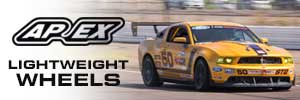I’ve been struggling with differential overheat issues on my “time attack” Mustang GT. I’ve wrapped the exhaust and have been running a diff cooler. Still at Sebring last month, diff temps climbed to just shy of 300F in the afternoon sessions. I was running royal purple 75w140. Fast forward to February. Last weekend I ran with Chin at Road Atlanta, my home track. Changes to the car included switching to Redline 75w110 for diff fluid and switching over to E85. I purchased my E85 tune (dedicated E85 tune, not flex) from Wengerd Performance. Also splurged and took VP racing X85 to the track in those 5 gallon pails. Highest diff temp I saw all weekend was around 260F. Ambient temp in the afternoon was about 62F which was slightly cooler than Sebring. Still I believe the combination of the Redline fluid and E85 (which should lower EGT - exhaust gas temp) may have resulted in the lower differential temp, as a lot of folks blame the closely routed exhaust for the diff heat soak, which, I believe is true.
I was also very pleased with the performance on E85 as the car had noticeable improvements in torque and seemed to rev more freely throughout the rpm range. At Road Atlanta, on the back straight, I usually go to 5th gear as 4th seems to flatten out at the top of the tach. That shift to 5th seems natural for the car. However on E85, the power kept coming and I instinctively kept 4th gear all the way to the braking point before 10a. On E85, that combination increased my top speed to 147mph on the back straight (up from 138mph). Personal best lap time posted in at 1.34.76 down from 1.36.85.
I’m very pleased with the E85 other than the cost of the VP fuel at over $11 per gallon to get pure E85. My local pump gas is testing at 75% E right now. Wengerd says the car will adjust within a certain range and running E75 on the dedicated E85 tune wouldn’t be a problem. I don’t fully understand what all happens in the ECU and how things adjust . I guess, worse case, the car will be running a little rich on the lower content E75 fuel. At WOT, that shouldn’t be much of an issue.
Comments, Questions and Suggestions are welcome
I was also very pleased with the performance on E85 as the car had noticeable improvements in torque and seemed to rev more freely throughout the rpm range. At Road Atlanta, on the back straight, I usually go to 5th gear as 4th seems to flatten out at the top of the tach. That shift to 5th seems natural for the car. However on E85, the power kept coming and I instinctively kept 4th gear all the way to the braking point before 10a. On E85, that combination increased my top speed to 147mph on the back straight (up from 138mph). Personal best lap time posted in at 1.34.76 down from 1.36.85.
I’m very pleased with the E85 other than the cost of the VP fuel at over $11 per gallon to get pure E85. My local pump gas is testing at 75% E right now. Wengerd says the car will adjust within a certain range and running E75 on the dedicated E85 tune wouldn’t be a problem. I don’t fully understand what all happens in the ECU and how things adjust . I guess, worse case, the car will be running a little rich on the lower content E75 fuel. At WOT, that shouldn’t be much of an issue.
Comments, Questions and Suggestions are welcome
Last edited:













